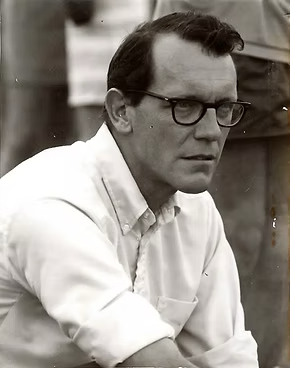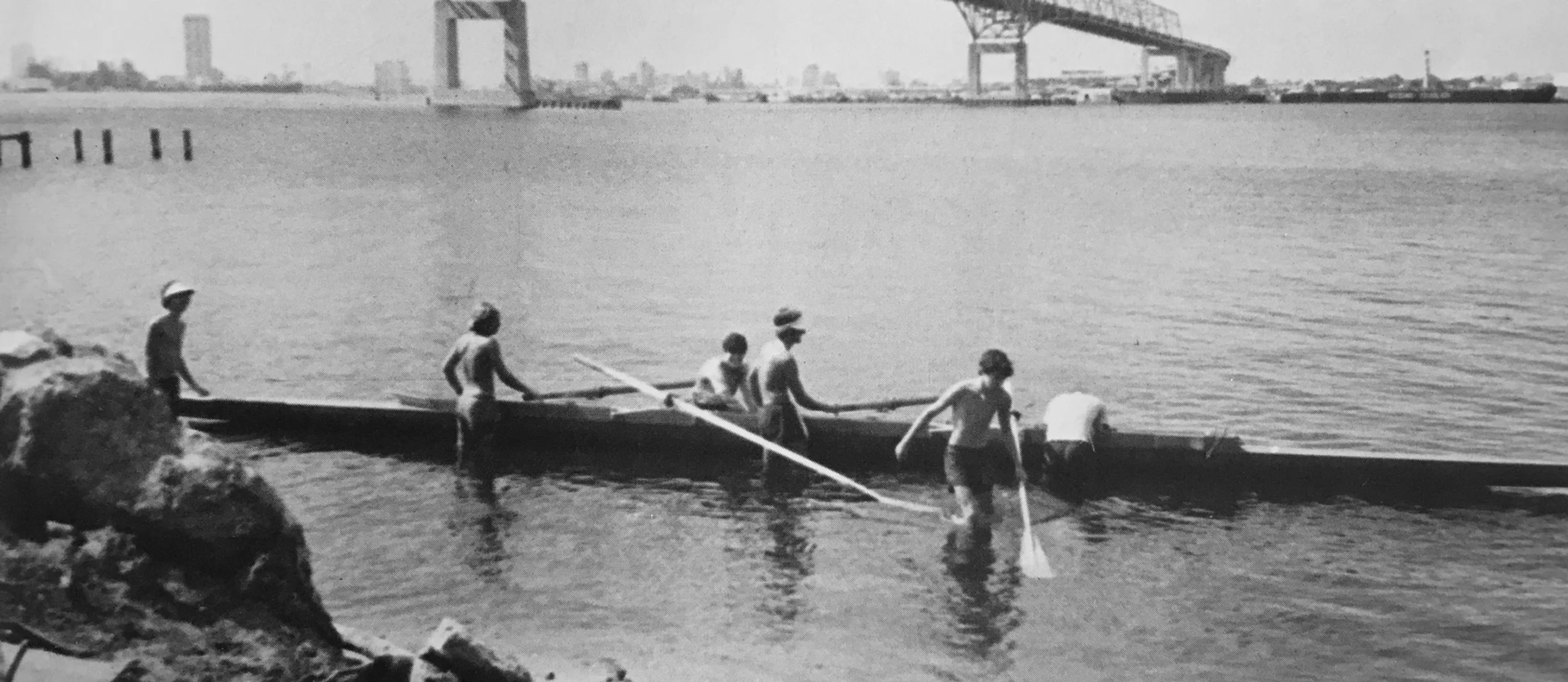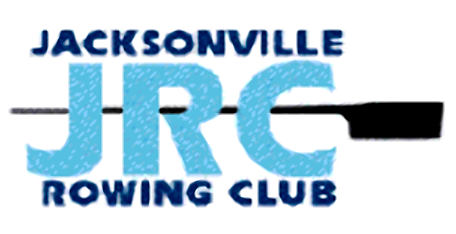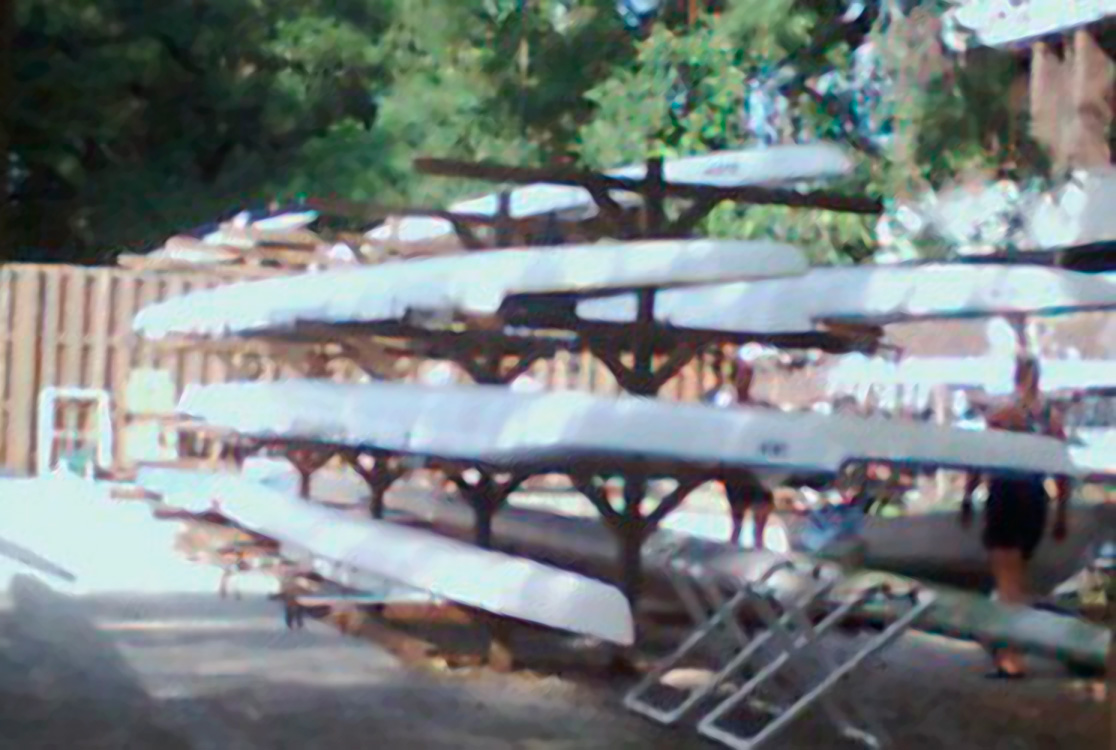JRC History
Rowing in the River City
Unlike counterpart riverine cities in New England and the Mid Atlantic states—home to many well-known rowing clubs founded in the 19th and early 20th centuries—concerted development of the rowing scene in Jacksonville is comparatively recent.
Primarily affiliated with local schools, Jacksonville-based crews would travel far afield to compete with other top rowers and scullers in the country, then return home to prep for their next achievement on the national (and world) stage. Masters rowing in Jacksonville was modest, but active and enthusiastic; it didn’t coalesce into something organized at scale until the latter part of the 20th century.
A women’s 8+ on the St. Johns River, with Alltel Stadium in the background. (Circa late ’90s–2002) Photo credit: JRC
1970s–1980s: The Nascent Foundations of JRC
The history of the Jacksonville Rowing Club (JRC) is rooted in the tradition of two early Jacksonville rowing clubs: the Remex Rowing Club and the St. Johns Few Rowing Club.
Remex Rowing Club was the first rowing club organized in Jacksonville and was founded by Robert Negaard (the revolutionary inventor of the wing-rigger) in the early seventies. Charlie Platt, who at the time was with Episcopal High School, also helped Remex get started. Remex was officially incorporated in the State of Florida on June 10, 1975. During its existence, the club organized the first club regatta in Jacksonville — the Remex Regatta — which ran on the St. Johns River through downtown, finishing at the Hilton Hotel. At that time, the Hilton had a Remex-inspired, rowing-themed pub in the hotel where participants could watch the race, enjoy refreshments, and look over the rowing memorabilia.
Although in the early eighties the Remex Rowing Club ceased to operate as a club, under the tutelage of Dr. A. Sanchez-Salazar, it did produce a number of National Champions and National Team members — Kristen Negaard in the 1977 Junior Single; Louise Novey in the 1979 Junior Single; Billie Brown in the 1979 Lightweight Single; Clay Ziegler in the 1980 Lightweight Double; and Barbara Sanchez-Salazar for the 1978 Junior National Team.

Episcopal High School Coach Charlie Platt. Photo credit: Episcopal High School

The 1973 Episcopal Rowing Team doing a water launch at the foot of the Hart Bridge, with downtown Jacksonville in the distance. Photo credit: Episcopal High School
1986-1987
In mid-1986, the predecessor organization of the JRC was created by a group including Pete Keegan, Brad, Kristen, & Bob Negaard, Mark & Jackie Beckenbach, Gail Ferguson, Brett Williams, and Bob Mustafa. This club was called the St. Johns Few.
In 1987, the St. Johns Few successfully put on the Sunshine State Games out of the Jacksonville University (JU) boathouse, but sometime shortly after that, the St. Johns Few disbanded.
1987: Establishment of Jacksonville Rowing Club
In the late 1987, the St. Johns Few was reorganized as the Jacksonville Rowing Club, Inc.
The club operated out of JU from a lean-to built onto the side of the JU boathouse. Dues and any other income were deposited into an account at JU and expenses paid by JU on behalf of JRC. In September of 1988, Roy Fuller joined the club and took over Treasurer duties, opening the club’s first bank account and taking over the accounting functions from JU. The JRC began to stand on its own.
1988: Building the First Fleet
Somewhere around late 1988, the club purchased its original boats from Bob Negaard. The club’s flotilla consisted of two Wing-It singles, one Seashell, one Boston, one Smallcraft, one double Smallcraft, and one Laser — for the most part, all recreational boats.
1989: Relocating to Pottsburg Creek
Due to water conditions on the St. Johns in early 1989, Peter Keegan (President of JRC at the time) and Mark Beckenbach (JRC member and then-coach at Jacksonville University)—with the help of Kirk Logan, State Representative Jim Tullis, and Garnett Ashby—approached Episcopal High School with the idea of building a small boathouse on their property on Pottsburg Creek. In mid-1989, JRC moved to the Episcopal High School property. Almost immediately after JRC left the JU property, the lean-to was taken over and expanded by the new Stanton Rowing Program, formed by Steve Hitchcock.
View on Pottsburg Creek from the Episcopal High School dock. October 1996. Photo credit: Paul MacArthur
View of the Cesery Blvd. bridge from a dock on Pottsburg Creek. October 1996. Photo credit: Paul MacArthur
1989: The First Coast Head Race
In 1989, Mark Beckenbach (JRC member and then-coach at Jacksonville University) and Peter Keegan (President of JRC at the time) conceived of and ran the first official head race in the state of Florida, naming the regatta the First Coast Head Race. The objective was to bring collegiate crews together for an exciting competition across the excellent waters of the St. Johns and Arlington Rivers. Organization of the regatta was a joint effort and became a fixture in the Jacksonville rowing community, with other clubs contributing or taking turns with running it every year.
After the first few years, the regatta was expanded to invite high school crews. It has grown considerably since then, and now includes events for Youth (both middle and high school), Collegiate, and Masters crews. In 2024, JRC agreed to take on full responsibility for organizing the regatta, as well as recruiting sponsors and volunteers to make it happen. The First Coast Head Race is hosted by JRC and is conducted from our waterfront site, with support from property holder DCF.
1990: Official Incorporation
JRC was officially recorded as a corporation in the State of Florida on July 3, 1990. At that time, its first official Board and officers were elected.
Early JRC logo with blue club colors

Early JRC oar design with blue club colors

1999: Aging Equipment
Rowing out of our humble lean-to on Episcopal’s property (back then, even Episcopal had nothing more than a really big shed), JRC was still a very small club, and equipment was always a challenge. The few boats we had were getting older and starting to break down, and we began running out of good boats to row. At that point, JRC had an old 4+ from JU, a wooden Pocock 2x, some Olympuses, a Vespoli 1x, and a Van Dusen 1x.
The wooden double —the Pocock—was actually JRC’s most advanced racing boat, and one of the club’s first boats. Named the Remex 1 as a nod to the former Remex Rowing Club, it eventually reached a such serious state of disrepair (from so much use) that it was taken to Bob Whitbeck’s garage for repair, though it was unclear whether it could be resuscitated. It was eventually donated to Jacksonville University around 2006 and now hangs from the ceiling in their new boathouse.
2002: Search for a New Location
Shortly after Episcopal High School moved into their new location, the school decided to develop their property with a state-of-the-art boathouse. Unfortunately, that meant JRC would have to find a new home for the club. JRC officially became homeless in 2002 and began rowing from a number of different sites in Jacksonville – the youth at Dr. Koster’s home, the master’s men from Dr. Sanchez-Salazar’s home. If not for the efforts of then-President Mark Beckenbach and Barbara Sanchez-Salazar, JRC would have dissolved.
Mark and Barbara convinced State Representative Stan Jordan and the Florida Department of Children and Families (DCF) to allow JRC to move to the DCF site, thereby consolidating our operations and bringing new life to JRC.

New JRC boathouse on the DCF property. Circa 2002. Photo credit: JRC
Our current enclosure was built over the course of two weekends with the amazing help of a number of JU students. Mark Beckenbach recruited a bunch of JU students as volunteers to help the JRC members build the boat compound. Once construction was complete, members rowed all the boats out of Episcopal one morning for the short distance to the new location.
2004: Rock Bottom and Rebirth
Around 2004, several JRC board members resigned, leaving Cameron Winship, Karen Upright, and Peter King remaining on the board, though none were officers. With no board officers, very few members, almost no money, and—except for the Vespolis—nothing of quality in the boathouse that anyone wanted to row, JRC’s future didn’t look promising. At this point, Cameron made a motion to disband the club and liquidate the equipment, but Peter King decided “There’s no way I am going to be remembered as the one who was sitting here when the club went down.” He took on the role of President and appointed Cameron Winship as Treasurer and Karen Upright as the Secretary. Looking back, the club was reborn that Monday night.
A lot of things needed to happen in order to make the club a “rowing” club again. The previous strategy of “recruit, recruit, recruit” to increase membership wasn’t working, so they decided to implement the philosophy of “Make it good, and people will come, and by golly, people might even stay for a while.”
The first order of business was to improve cash flow so JRC could direct the money into things that would serve members. One major expense was payment for a commercial storage unit. In order to make our erg room, we displaced DCF’s storage area for donated furniture, so we were paying to store the furniture off-site. To address this problem, and since DCF already had a concrete pad outside, JRC used club money to buy a storage building that was assembled by club members over the course of a weekend. Another monthly expense was a JRC phone line at $50 a month, but it took years to finally bring that to a halt.
Now, to make the club better. What was the biggest turn off for members new and old? Not having a dock was just unacceptable. Wading out into the muck was dangerous and very unpleasant—imagine being a new member in the winter wading out into cold filthy water. Incredibly, Will Lutat (a new member at that time) didn’t quit on the spot after he slipped backwards in the cold muck and was covered from head to toe with black smelly ooze. Witnesses at the time said he looked like the Creature from the Black Lagoon.
2004: The Constructon of “Dock Salazar”
The DCF site has been a blessing to JRC — though in the early days, there was no way to get boats to the water without wading thru knee-deep muck. Considering what’s at the bottom of Pottsburg creek, wet launching was dangerous and unappealing, for sure. Once again, motivation, ingenuity, and elbow grease to the rescue! Dr. Sanchez-Salazar found a partner in his neighbor, engineer Mr. Peter House, to help design and direct the building of a dock and pier for JRC.
Dr. Sanchez-Salazar ordered the floating units, had them delivered, arranged for the design work and got Peter House to come to the “beach” several times to supervise. After several weekends of back-breaking work, JRC members had the pilings in, the deck screwed down, and then the dock assembled and floated into position. Bob Whitbeck and Peter King recall climbing to the top of one of the pilings and hanging on it like monkeys in an effort to drive it through the soil. Peter fell into a huge hole at the bottom of the river while essentially doing the splits, and Tom Rizzo got his hands crushed a couple of times. After several weekends of work and pilings, decks, docks, ramps, anchors – finally we had a dock. This was a huge improvement to the club and wouldn’t have happened if not for Dr. Salazar. For a long time, members called the dock, “Dock Salazar.” (Catch the pun?)
Dr. Sanchez-Salazar is a perfect example of what happens when you empower a motivated person to do whatever they can do, and give them the resources to do it.
Story from the dock construction: For a while, we had the floating connect dock, but no fixed dock to tie it to. One day somebody untied it and it went out with the tide, but luckily didn’t make it past the University bridge. Peter King pulled up to it with a 1x, got out and used one of the oars to row it and the single back to shore.
2005-2009: Equipment Upgrades
The next major issue to address at JRC was the equipment. Due to heavy use, and the limitations of even the best repairs, most of the boats were in sad shape and needed to be scrapped. This was finally dealt when JRC had one of its first “boathouse cleanup” days. A long construction dumpster wasdelivered to the boathouse with the intention of liquidating some of these boats, and many boats were cut into pieces that day, including a 4+ called Waterloo, and a number of boats that had been donated to JRC by a defunct club near Daytona.
With so many old shells cleared out, JRC finally had empty rack space—and lots of it. And a good excuse to get some boats.
Between donations, club purchases, and private shells, we eventually filled all the racks in the boathouse. The mass disposal event was an unpopular move with some club members and made some people angry. There was also an unfortunate case of friendly fire that day, requiring profuse apologies. But it was done, and JRC could stock up with better equipment now there were plenty of open racks.
Marley Brown was fairly new to the club at that time and used his relationship with Ted Reideburg to get some boats from The Bolles School. Marley was able to convince Ted to basically give us two very rowable 8+ shells: the No Name and the Iverson. Ted even drove the boats over (since we didn’t have a trailer that could haul eights at that time).
In addition, JRC purchased a number of singles, doubles, and a four. We actually had some good boats at this time:
- Two eights — donated by Bolles
- An eight — donated by a number of youth parents, led by Nancy and Chip Lilly
- A 4+ — from JU
- Vespoli 4+ (the TJ, donated to the club by a youth parent, Dr. Gene Bebeau
- Vespoli 1x
- Vespoli 2x — purchased new by member Dan Rooney and sold back to the club
- And some Aldens and Olympuses.
With so much rack space opening up, Wintech racing representative Brendan Crotty came to our boathouse to sell us some boats. Wintech singles were purchased by members Tom Rizzo, Jim Kolb, Paulo Lorenzo, and David Fekke.
JRC then purchased a Wintech heavy 2x and a heavy 1x. These were the first major boat purchases by JRC, although the club did purchase the Vespoli 2x from Dan Rooney using a loan from Mark Beckenbach in 2002. Not to be outdone, Peter King purchased a single from Fluidesign and racked it at the boathouse, and began training to compete at Nationals. All these private boats began to pay boat storage fees to the club, which helped JRC’s bottom line even more.
Our Learn to Row program was starting to get a foothold, and the JRC Youth program began to really take off under Barbara Sanchez-Salazar. People started to join the club and actually stayed.
New members decided they wanted to contribute as well, and a lot of good people started to get involved on the Board: new members like Paulo and David, and older members who in the past hadn’t wanted to be on the board. More members began contributing to the club, bringing their motivation and experience in order to improve JRC in various ways.
New member Jim Kolb, an architect, decided that he could redesign the whole boathouse and create more rack space. He produced a 3D CAD design that he used to direct the reconstruction of the boathouse interior. After a few days of hard work, the boathouse was completely redesigned to a more logical configuration and even more space was opened up.
New member Andy Ratajczyk, an electrical engineer, figured that we could power the boathouse with solar panels and provide underground water to the site. After some work directed by Andy, the boathouse now had power and water.
Veteran member Bob Schumacher started coaching the youth and transferring his long rowing experience to the kids.
Meanwhile, more boats were being delivered to the boathouse: Andy and Juan purchased their own singles from Kashper, and the club purchased a lightweight 2x and a Wintech heavyweight 4+ (a group of masters men helped out and paid for half).
JRC was really starting to look and feel like a rowing club. All of a sudden, we had a “boathouse” full of boats! And Most of them really good boats that people could take pride in and actually win some races in. So many, in fact, that Andy Ratajczyk commissioned the company WW Gay to make two rolling racks as portable storage for the older boats.
2005: New Club Colors and Oar Design
After years of using blues for its official colors and oar design, an observation was made that the club needed a change to be more distinctive among the many other clubs also using blue. JRC elected to rebrand, choosing red and black as their new colors, anda new oar design of a black V on a field of red.

2007: A New Trailer to Kick Off a New Racing Era
Thanks to fundraising by the youth and masters working together, JRC was able to purchase a new aluminum trailer in 2007 that allowed our teams to transport our own shells to race sites. In 2009, this enabled us to travel in full force to the Head of the Hooch and the Head of the South, with an outstanding showing at both races, as far as participation and medals.
2008: Boathouse Steward
An official “Boathouse Steward” position was created in early 2008, with Marley Brown appointed as the first Steward by the JRC Board . With increasingly active recreational and competitive masters and youth programs keeping the JRC boat inventory in constant use, not to mention a new trailer in the fleet, it was decided to create a designated position to oversee the life of the boats, monitor any damages and implement repair schedules, and intervene to resolve potential conflicts about boat usage, as an arbiter able to see the “bigger picture.”
2015: Expansion of Masters Race Program
In 2015, interest from an unusually large recent influx of new members prompted the club to expand and develop a much more serious race prep program among both sweep crews and scullers. The program was first developed and led by Dana Ballis Owens and former Navy coxswain Tim Cadigan, with morning, evening, and weekend practices and erg sessions, as well as performance targets. JRC crews travelled to and medalled at numerous regattas across the Eastern U.S., and the program has continued to evolve, with Alex Miller and Jon MacDonald eventually taking on the roles of Women’s and Men’s Race Coordinators, respectively.
2020–2021: COVID-19
Like so many clubs, JRC practices became almost unrecognizable during the pandemic. Adhering to social distancing is impossible in the normal context of rowing, so during lockdown, practices were put on hold. Some members opted to row their singles in the absence of official practices, in order to still get time on the water, but the club was largely shut down for an extended period of time. Once lockdown ended, JRC mandated strict rules for mask wearing and other preventative measures, and group rows were gradually reintroduced, though sparsely attended at first. As time went on and conditions improved, the club began to resume its normal practice formats, times, and attendance levels.
2024: Equipment Upgrades
A new sweep oar racks cabinet was constructed in 2024, switching to a hanging versus horizontal arrangement, and with additional space to accommodate more sets of oars.
Following successful trials with the competitive race group, the club transitioned most shells in our inventory to an industry-standardized clip-in shoes system. This equipment policy change was made to improve shared-equipment hygiene and to enhance rower performance and comfort, allowing them to select and bring their personal rowing shoes for better individual fit and function.
The Present and Future of JRC
Over the years JRC has become Northeast Florida’s true community rowing club. Our members transit to practice from places as far south as Daytona Beach, St. Augustine, and Palatka; from Kings Bay, Georgia in the north; the coastal communities of Atlantic, Neptune, Jacksonville, and Ponte Vedra Beaches; and from numerous inland locations all across Northeast Florida. The JRC Board has also integrated representatives from all the scholastic and collegiate rowing programs in the area since its inception, making it a central figure in the local rowing scene. JRC is also very well-connected within the national rowing community.
Since our founding, we have developed learn-to-row programs for youth and adults, judge/referee development programs, coxswain clinics, and a competitive masters program; conceived (and initially ran) the First Coast Head Race; produced the Trout River Rowing Festival; and organized a small community youth rowing program, though that was disbanded in 2018.
Today, the JRC provides sculling and sweep rowing for novice and experienced, recreational and competitive adults. No matter what your rowing experience or interests, there is something for you at JRC!
Club Presidents
Since our inception, the Presidents of the Club have been:
| 1987 to July 1990 | Peter Keegan |
| July 1990 to July 1991 | Kelly Mannel |
| July 1991 to July 1996 | Mark Frampton |
| July 1996 to July 1997 | Pete Keegan |
| July 1997 to January 2001 | Barbara Sanchez-Salazar |
| January 2001 to January 2003 | Mark Beckenbach |
| January 2003 to January 2004 | Beth Marten |
| January 2004 to November 2007 | Peter King |
| November 2007 to July 2008 | Leslie Smith |
| July 2008 to January 2009 | Tom Rizzo |
| January 2009 to January 2011 | David Fekke |
| January 2011 to January 2013 | Janet Frampton |
| January 2013 to January 2015 | Stacey Legler |
| January 2015 to January 2016 | Anthony Shrubsall |
| January 2016 to January 2018 | Chris Wasilewski |
| January 2018 to January 2019 | Rob Whitbeck |
| January 2019 to January 2020 | Shana Brodnax |
| January 2020 to January 2021 | Lee Adolph |
| January 2019 to January 2021 | Larry Abramson |
| January 2021 to January 2023 | Lindsay Shaw |
| January 2023 to January 2024 | Rebecca Iannello |
| January 2024 to January 2025 | Elizabeth “Bibbs” Harris |
| January 2025 to Present | Joshua Carson |
